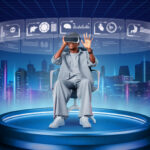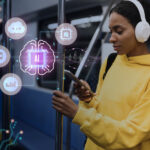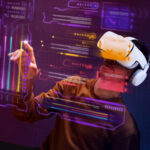Educational Trends Driving Change in 2023 and Beyond
Revolutionizing Education
As the world continues to rapidly evolve, education must also adapt to meet the needs of modern society. The traditional approach of learning in a classroom followed by practical application is no longer enough. With the pace of change accelerating, new educational trends are emerging to equip individuals with the skills necessary to thrive in this dynamic environment. We will explore further the most significant trends that are shaping education in 2023 and beyond. We will also explore how they will impact the way we learn and grow as a society. From emerging technologies to innovative teaching methods, these educational trends will revolutionize the way we approach education and prepare us for a future that is constantly evolving.
Educational Trends
Artificial Intelligence
As a start, Artificial Intelligence (or AI) is the most transformative technology of the 21st century, which has the potential to reshape every industry and field of human activity, including education. AI can help both students and teachers in the form of virtual assistants to manage their time. This is done through tutoring systems that provide personalized learning experiences and power remote and online learning systems. It can also be used for language translation in educational settings where pupils speak a variety of languages, among many other applications. While AI has the potential to address some of the toughest challenges in education, it also poses challenges. Therefore, the rollout of this highly disruptive technology should be done in a way that is fair and equitable.
It is noteworthy to remind you that the global Covid-19 pandemic forced schools, universities, and course providers to develop capabilities to deliver education at a distance. Remote, online, and hybrid learning has taken off, and the rise of online education technology platforms has enabled “lifelong learning.” These platforms provide an opportunity for individuals to continue with their education. This educational trend has marked its territory and made life easier, especially when busy adult lives make it difficult to attend classes in person. Additionally, vocational and technical courses teaching a diverse range of skill sets are likely to become more popular. This is because schools work with employers to develop effective solutions to problems caused by the skills gap.
Virtual reality (VR) and augmented reality (AR)
We also have virtual reality (VR) and augmented reality (AR), two forms of extended reality (XR) that are becoming increasingly prominent within education systems. VR allows users to step into a virtual world, and there are a vast and growing number of “experiences” that let us do everything from stepping back in time and experiencing history through our own eyes to training for difficult and dangerous tasks. AR involves superimposing computer-generated images onto what the user is actually seeing, providing real-time information, and can be used in textbooks that contain images and models that “come alive.”
Soft Skills and STEM Education
Soft Skills and STEM Education prepare students for the future. As technology continues to advance and machines take over routine tasks, the importance of soft skills is becoming more evident. Soft skills, including communication, teamwork, creative thinking, interpersonal problem-solving, relationship management, and conflict resolution, are human skills that cannot be easily replicated by machines. These skills are crucial for success in the workplace and will increasingly be taught as part of technical education. This is particularly relevant in STEM fields, where the emphasis has traditionally been on core skills such as mathematics, engineering, and computer programming. HR experts agree that soft skills are increasingly key to company success, but they can be difficult to measure and assess. In this article, we will explore the importance of soft skills in STEM education and how they can prepare students for the future.
Future of education is an exciting and ever-evolving landscape, with educational trends
To simplify all of the above, we believe that the future of education is an exciting and ever-evolving landscape, with educational trends like AI, remote and online learning, vocational and technical courses, and virtual and augmented reality all set to play a major role in shaping the way we learn and grow. As technology continues to advance and society changes, we can expect to see new and innovative approaches to education emerge. These approaches include personalized learning experiences and the integration of social and emotional learning into curricula. The COVID-19 pandemic has accelerated the adoption of remote and online learning, which is likely to persist even after the pandemic ends.
There will also be a growing emphasis on vocational and technical courses, as well as virtual and augmented reality, which offer immersive and hands-on learning experiences that are simply not possible in traditional classroom settings. Furthermore, AI will continue to play a critical role in education, from grading to personalized learning experiences, with the potential to revolutionize the way we approach teaching and learning.
As a remote agency operating worldwide, we’re always ready to hear about your needs and answer your inquiries. Connect with us on LinkedIn, send us a direct message on Instagram, or drop us a message on WhatsApp, and let’s take your business to the next level together!
Recommended Reads: Web3 Business Trends Expected in 2023 (betterflylb.com)
Author Profile
Latest entries
 Blog ListApril 24, 2024Social Commerce in 2024: The Rise of Instant Shopping
Blog ListApril 24, 2024Social Commerce in 2024: The Rise of Instant Shopping Blog ListApril 17, 2024Cryptocurrency in 2024: Beyond the Hype for Millennials.
Blog ListApril 17, 2024Cryptocurrency in 2024: Beyond the Hype for Millennials. Blog ListApril 14, 2024Generative AI in 2024: A Revolution on Hold?
Blog ListApril 14, 2024Generative AI in 2024: A Revolution on Hold? Blog ListApril 3, 2024Why User-Generated Content (UGC) is Your New Marketing Must-Have
Blog ListApril 3, 2024Why User-Generated Content (UGC) is Your New Marketing Must-Have


















